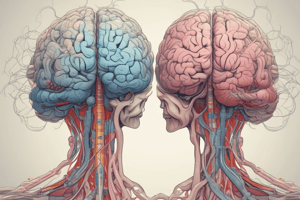Podcast
Questions and Answers
What primary role does cerebrospinal fluid (CSF) play in the central nervous system (CNS)?
What primary role does cerebrospinal fluid (CSF) play in the central nervous system (CNS)?
- Oxygen transport to the brain
- Regulating body temperature
- Serving as a medium for neurotransmitter synthesis
- Providing mechanical cushioning (correct)
What is the approximate protein concentration in cerebrospinal fluid (CSF)?
What is the approximate protein concentration in cerebrospinal fluid (CSF)?
- 20 g/L
- 200 g/L
- 2 g/L
- 0.2 g/L (correct)
How much cerebrospinal fluid (CSF) is newly produced per day?
How much cerebrospinal fluid (CSF) is newly produced per day?
- 600-700 ml (correct)
- 100-200 ml
- Less than 50 ml
- 1-2 liters
Which of the following substances has higher levels in cerebrospinal fluid (CSF) compared to plasma?
Which of the following substances has higher levels in cerebrospinal fluid (CSF) compared to plasma?
In addition to waste removal, what other essential function does cerebrospinal fluid (CSF) perform?
In addition to waste removal, what other essential function does cerebrospinal fluid (CSF) perform?
What role does cerebrospinal fluid (CSF) serve in clinical diagnosis?
What role does cerebrospinal fluid (CSF) serve in clinical diagnosis?
What is the estimated total volume of cerebrospinal fluid (CSF) in the central nervous system (CNS)?
What is the estimated total volume of cerebrospinal fluid (CSF) in the central nervous system (CNS)?
Through which structure does CSF flow from the lateral ventricles to the third ventricle?
Through which structure does CSF flow from the lateral ventricles to the third ventricle?
Where is CSF predominantly secreted in the CNS?
Where is CSF predominantly secreted in the CNS?
Which of the following substances is restricted from passing through the blood-CSF barrier?
Which of the following substances is restricted from passing through the blood-CSF barrier?
Where is CSF eventually reabsorbed into the body?
Where is CSF eventually reabsorbed into the body?
Besides its protective functions, what role does CSF play in delivering to the nervous system?
Besides its protective functions, what role does CSF play in delivering to the nervous system?
Flashcards are hidden until you start studying
Study Notes
Cerebrospinal Fluid
Cerebrospinal fluid (CSF) is a vital component of the human body, playing essential roles in the central nervous system (CNS). It is an ultrafiltrate of plasma contained within the ventricles of the brain and the subarachnoid space of the spinal cord.
Functions
The primary functions of CSF include:
- Mechanical Cushioning: CSF acts as a mechanical buffer, protecting the brain and spinal cord from mechanical forces and injury.
- Immunological Protection: CSF provides basic immunological protection to the CNS, helping to maintain the health of the nervous system.
- Waste Removal: CSF is responsible for removing metabolic waste products from the brain and spinal cord.
- Neuromodulator and Neurotransmitter Transport: CSF transports neuromodulators and neurotransmitters, which are crucial for proper brain function.
- Clinical Diagnosis: CSF samples are obtained through lumbar puncture for diagnostic purposes, providing valuable information about the health of the CNS.
Composition
CSF has a protein-poor composition, with an average protein concentration of approximately 0.2 g/L. Its sodium, potassium, and calcium levels are slightly lower than plasma, while its chloride, CO2, and bicarbonate levels are higher than plasma. The glucose concentration in CSF is about 2/3rds of the plasma value.
Circulation
CSF is continuously secreted at a rate of 0.2-0.7 ml/min, resulting in 600-700 ml of newly produced CSF per day. The total volume of CSF in the CNS is estimated to be around 150-270 mL. CSF flows through the ventricular system unidirectionally in a rostral to caudal manner. It passes from the lateral ventricles to the third ventricle through the interventricular foramen, then through the cerebral aqueduct to the fourth ventricle. From the fourth ventricle, a portion of the CSF enters the central canal of the spinal cord, while the majority passes through the apertures of the fourth ventricle into the subarachnoid space. Eventually, CSF is reabsorbed into the dural venous sinuses through arachnoid granulations.
Production
CSF is predominantly secreted by the choroid plexus, which is located within the lateral, third, and fourth ventricles of the brain. The choroid plexus is a network of simple cuboidal epithelial cells surrounded by a basement membrane and connective tissue, with fenestrated capillaries allowing for filtration of plasma. These cells are interconnected by tight junctions, creating a blood-CSF barrier that helps regulate the composition of CSF and protects the brain.
Roles in the Body
Apart from its protective and immunological functions, CSF plays a critical role in the maintenance of the CNS. It helps to regulate the environment of the brain by controlling the passage of ions and small molecules, while larger substances such as cells and glucose are restricted from passing through the blood-CSF barrier. CSF also plays a role in the delivery of nutrients and the removal of waste products from the nervous system.
In conclusion, cerebrospinal fluid is a crucial component of the human body, serving a variety of essential functions within the CNS. Its production, circulation, and composition are strictly regulated to ensure proper brain function and health.
Studying That Suits You
Use AI to generate personalized quizzes and flashcards to suit your learning preferences.




